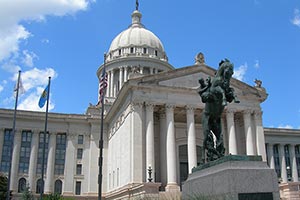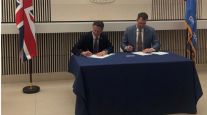Oklahoma Transportation Department Presents Budget Needs to State Lawmakers

Lawmakers in the Oklahoma House of Representatives on Jan. 5 sat through a second day of in-depth budget hearings that give agency heads a chance to ask for more money.
State Transportation Department Director Mike Patterson explained his budget needs to a couple dozen representatives in the House chambers. He didn't present an overall budget request but instead talked about historical funding and how the agency operates.
“For the last decade, we have not asked for additional money,” Patterson said after his presentation. “We have simply asked for what is statutorily designed to come to the agency.”
During this budget year, transportation is expected to miss out on more than $50 million that was pulled from its account and sent to the state's general revenue fund. The money is automatically allocated from motor fuel tax collections, but officials agreed to a one-time diversion last year to help balance the budget.
“We just want that back,” Patterson said. “If that constitutes an increase, I guess it does.”
Jason Sutton, press secretary for House Speaker Charles McCall, said the agencies were asked to present just historical budgets and be prepared to answer questions about what they will request.
"We did not require them to provide a budget request at this time, but some of them will undoubtedly do so," Sutton said.
The budget hearing Jan. 5 wasn't just about money. One representative asked about advances in technology, and another asked about how the agency plans its road construction schedule.
The budget hearings could help new lawmakers understand more about the agencies they fund. It's also a chance for agency heads to talk about how they are saving money or raising revenue for the state.
One option being considered at the state Capitol would increase the motor fuel tax. Patterson said he hasn't been a part of the discussions and no lawmaker has asked him to come out for or against it.
Raising the fuel tax could mean more money that is automatically apportioned to the Transportation Department.
“I don't know that we wouldn't advocate for it,” he said. “When you look at the volatility of oil prices, I don't know that as an individual you would notice that the motor fuel tax went up a dime.”
During his presentation, which was held in the full House chambers rather than a committee room, Patterson highlighted the difference his agency has with the Oklahoma Turnpike Authority. While the OTA can charge people to use its roadways, the Transportation Department does not have a way to raise its own revenue.
Patterson said he also doesn't have the money to build new highways, a reference to several new turnpike projects planned for Oklahoma and Tulsa counties.
“They can generate revenue. I can't generate revenue,” he said. “My revenue source is whatever you provide. When we get into these budget crunch times, we know there's going to be a reduction in revenue.”



